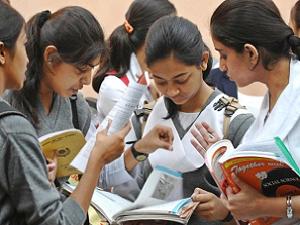
The newly introduced common entrance exam called Joint Entrance Examination (JEE) replacing the AIEEE has received a record number of applications. Over a 14 lakh aspirants registered for the JEE 2013 entrance exam.
Last year AIEEE had received 11.2 lakh applications, This year new entrance exam got some good response from the students.
Only 1,50,000 of the top rankers in JEE (Main), which includes students from all categories (GE, OBC (NCL), SC and ST) will be eligible to appear in JEE (Advanced)-2013 (hitherto known as IIT-JEE) for admission to IITs, IIT BHU and ISM Dhanbad. Last year, IIT-JEE was the entrance exam for admission to IITs, now it is replaced by JEE Advanced exam.
The central Board of Secondary Education (CBSE), New Delhi is conducting the first JEE Main 2013 entrance exam in April 2013 in both online and offline mode, The online exam will be conducted from April 8 to 25. The offline exam will be conducted on April 07.
The merit list for admission to NITs, IIITs, DTU, Delhi and other CFTIs will be prepared by giving 40% weightage (suitably normalised) to class XII (or equivalent examination) or other qualifying examination marks and 60% to the performance in JEE (Main) Examination.
JEE Main 2013 Pattern:
Paper 1: Objective type questions with equal weightage to Physics, Chemistry and Mathematics based on Common Core syllabus.
Paper 2: Objective type questions for Mathematics & Aptitude Test and question to test drawing aptitude for Drawing Test.
JEE Advanced 2013 Pattern:
In JEE (Advanced) - 2013, there will be two question papers, each of three hours duration. The question papers will be bilingual (in English and Hindi). Each of the question papers will consist of three separate sections on Physics, Chemistry and Mathematics. The questions will be of objective type, designed to test comprehension, reasoning and analytical ability of candidates. In some sections, incorrect answers will be awarded negative marks. The answers for each of the questions are to be marked on a separate, 2-sheet carbonless paper.



 Click it and Unblock the Notifications
Click it and Unblock the Notifications



























